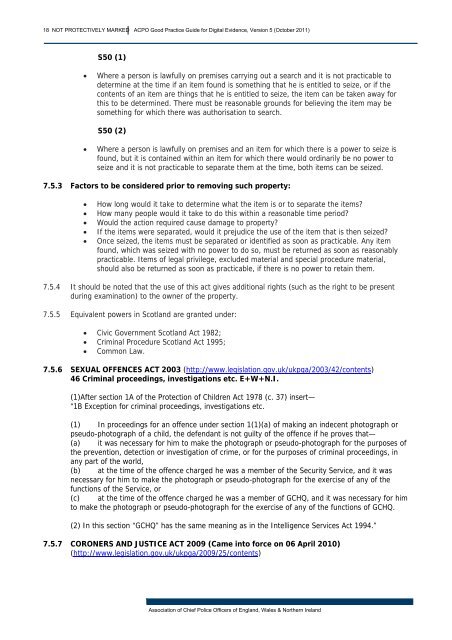ACPO Good Practice Guide
ACPO Good Practice Guide
ACPO Good Practice Guide
You also want an ePaper? Increase the reach of your titles
YUMPU automatically turns print PDFs into web optimized ePapers that Google loves.
18 NOT PROTECTIVELY MARKED <strong>ACPO</strong> <strong>Good</strong> <strong>Practice</strong> <strong>Guide</strong> for Digital Evidence, Version 5 (October 2011)<br />
S50 (1)<br />
• Where a person is lawfully on premises carrying out a search and it is not practicable to<br />
determine at the time if an item found is something that he is entitled to seize, or if the<br />
contents of an item are things that he is entitled to seize, the item can be taken away for<br />
this to be determined. There must be reasonable grounds for believing the item may be<br />
something for which there was authorisation to search.<br />
S50 (2)<br />
• Where a person is lawfully on premises and an item for which there is a power to seize is<br />
found, but it is contained within an item for which there would ordinarily be no power to<br />
seize and it is not practicable to separate them at the time, both items can be seized.<br />
7.5.3 Factors to be considered prior to removing such property:<br />
• How long would it take to determine what the item is or to separate the items?<br />
• How many people would it take to do this within a reasonable time period?<br />
• Would the action required cause damage to property?<br />
• If the items were separated, would it prejudice the use of the item that is then seized?<br />
• Once seized, the items must be separated or identified as soon as practicable. Any item<br />
found, which was seized with no power to do so, must be returned as soon as reasonably<br />
practicable. Items of legal privilege, excluded material and special procedure material,<br />
should also be returned as soon as practicable, if there is no power to retain them.<br />
7.5.4 It should be noted that the use of this act gives additional rights (such as the right to be present<br />
during examination) to the owner of the property.<br />
7.5.5 Equivalent powers in Scotland are granted under:<br />
• Civic Government Scotland Act 1982;<br />
• Criminal Procedure Scotland Act 1995;<br />
• Common Law.<br />
7.5.6 SEXUAL OFFENCES ACT 2003 (http://www.legislation.gov.uk/ukpga/2003/42/contents)<br />
46 Criminal proceedings, investigations etc. E+W+N.I.<br />
(1)After section 1A of the Protection of Children Act 1978 (c. 37) insert—<br />
“1B Exception for criminal proceedings, investigations etc.<br />
(1) In proceedings for an offence under section 1(1)(a) of making an indecent photograph or<br />
pseudo-photograph of a child, the defendant is not guilty of the offence if he proves that—<br />
(a) it was necessary for him to make the photograph or pseudo-photograph for the purposes of<br />
the prevention, detection or investigation of crime, or for the purposes of criminal proceedings, in<br />
any part of the world,<br />
(b) at the time of the offence charged he was a member of the Security Service, and it was<br />
necessary for him to make the photograph or pseudo-photograph for the exercise of any of the<br />
functions of the Service, or<br />
(c) at the time of the offence charged he was a member of GCHQ, and it was necessary for him<br />
to make the photograph or pseudo-photograph for the exercise of any of the functions of GCHQ.<br />
(2) In this section “GCHQ” has the same meaning as in the Intelligence Services Act 1994.”<br />
7.5.7 CORONERS AND JUSTICE ACT 2009 (Came into force on 06 April 2010)<br />
(http://www.legislation.gov.uk/ukpga/2009/25/contents)<br />
Association of Chief Police Officers of England, Wales & Northern Ireland


